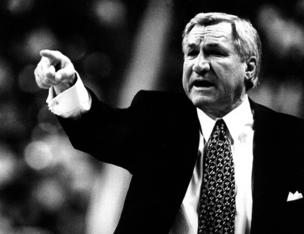One of my biggest disappointments in sports is never getting to see Dean Smith coach in person at North Carolina. Just two months after I arrived in Chapel Hill as an undergraduate in the fall of 1997, Coach Smith announced his retirement. It is hard for me to believe he hasn’t been on the sideline for nearly 18 years. While I was never able to witness Smith’s greatness staging a comeback thanks to those hoarded timeouts or raising four fingers, I feel fortunate to have grown up in Dean Smith’s Chapel Hill. Dean Smith’s legacy illustrates everything right about intercollegiate athletics.

Dean Smith passed away at the age of 83 over the weekend. Coach Smith’s tenure in Chapel Hill spanned parts of four decades. When you think about everything that occurred from the 1960s to the 1990s, it is surprising that Smith was able to adapt to the changes in students, universities, sport, and society.
Well, surprising to anyone who never saw the man coach.
Dean Smith’s legacy as an innovator in the game of basketball is unassailable. In fact, much of what today we take for granted in the game is a result of Coach Smith. The shot clock. Huddling before a free throw. Changing defenses. Using a 5th foul as an impromptu timeout. Standing up and clapping for a player returning to the bench. Pointing to the passer.
Ah, pointing to the passer. That may be the best of them all.
Dean Smith valued the pass more than the basket. Rather than pointing to the person who scored, Coach Smith (and now all UNC coaches, players, and fans) point to the person who passed the ball enabling the player to score.
It was such a simple gesture, but so emblematic of his philosophy.
Many often referred to Smith’s “system” while others derided it as IBM Basketball. Smith preferred philosophy to describe his process.
Ever the meticulous planner and organizer, Coach Smith’s philosophy can be simply described:
Play Hard, Play Smart, Play Together.
Dean Smith believed in university, basketball program, team, and individual. In that order.
He worried about the “me first” attitude prevalent among players and society at large.
We talk a great deal about the need to reform intercollegiate athletics. How much could be solved by replacing “me first” with the Carolina system—er, philosophy?
Now, many ABC fans—Smith spawned many Anybody but Carolina fans among other ACC schools—would suggest the recent academic and athletic scandal as a sign that the Carolina way doesn’t work. It was a facade.
Frankly, I think there is probably some blame we should place on Coach Smith for everything that has happened the past few years.
Dean Smith taught us that UNC was better. Dean Smith taught us that you can live with integrity, represent the university with class, graduate players, and, yes, win more games than anyone else.
What he didn’t teach us is how hard it is to do all of those things. He did it all seemingly so easily that we took the Carolina philosophy for granted. We thought we were special and above the problems and dangers of intercollegiate athletics.
Obviously, we aren’t.
Since the word of his death spread yesterday, I’ve been thinking and reading a great deal about his legacy. Yet, I can only imagine how uncomfortable he would have been at all of the attention.
However, I suspect he would be proud at how little of the focus has been on his win-loss record or even his championships.
Dean Smith’s legacy includes efforts to combat the racism of North Carolina in the 1960s. He not only recruited the first black scholarship athlete, but also helped desegregate a popular Chapel Hill restaurant. We only know about the latter thanks to someone else telling the story.
Smith wanted to do the right thing because it was the right thing. Not only did he not seek the acclaim, he avoided it.
In a conservative state, Dean Smith consistently championed social justice and progressive causes. Coach Smith argued against the Vietnam War, nuclear weapons, and the death penalty.
A noted contributor and supporter of the Democratic party, only one thing would get him to support a Republican— if the Republican was a former player.
Current North Carolina Coach Roy Williams once told Smith that he was loyal to a fault. Smith replied that Williams should never use those two words in a sentence together.
In a college sports world that is too quick to use and abuse players, Dean Smith was fiercely loyal. He was a second father to his players who sought his advice long after their playing days ended.
He would encourage his players to leave school early for the NBA if assured millions, but insisted they come back to finish their education. His players listened and more than 96% graduated. In the era of one and dones, he argued that freshman should be ineligible to play because the first year was so critical to adjusting to college life.
Too often, student-athlete seems paradoxical and rhetorically disingenuous. For Dean Smith, it was reality.
I imagine casual observers of basketball and sports may be reading the tributes to Dean Smith’s legacy with cynicism.
Forget the Hall of Fame, shouldn’t the guy be put up for sainthood?
Coach Smith was worried about this and told people not to deify him.
He always sought to deflect attention to his players or assistant coaches.
For the next few days, we’re going to be talking about, remembering, and celebrating the greatest coach and —sorry, Kansas— one of the greatest North Carolinians.
Forgive us, Coach. We know you wouldn’t want all of this focus on you.
Really, this is our attempt to point to the passer.
We want acknowledge your assist.
Your assist that helped improve civil rights. Your assist that helped a great American university. Your assist that helped the cause of social justice.
Your assist that helped us all.
Thanks, Coach.

